

KENNESAW, Ga. | Nov 3, 2020
Family. That’s the one word that first-year student Henriona Coalson uses to describe her on-campus living experience at Kennesaw State.
“This has been as close to a family to me as I’ve ever had in my whole entire life,” said Coalson, a business and pre-nursing major, who lived in group homes while in foster care prior to coming to KSU.
Coalson resides in one of the University’s living-learning villages, a community of students with similar academic, personal or lifestyle interests who live together in the same section of on-campus housing. She is part of the newest community, called ASCEND, which opened earlier this fall and serves first-year students who have dealt with homelessness, food insecurity or the foster care system.
“This is one of the first of its kind in the country,” said Marcy Stidum, director of KSU’s CARE Services, the unit that serves KSU students who struggle with homelessness, food insecurity or have been a part of the foster care system. “The opening of the ASCEND living-learning village was the solution that CARE Services and, more importantly, our students needed.”
ASCEND was created specifically to serve the growing population of KSU students in need of housing while also recognizing their unique circumstances and allowing them to form deeper connections with each other, she added.
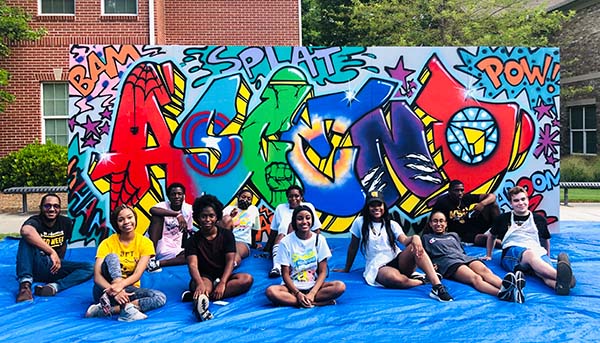
This year, more than 550 KSU students chose living-learning villages for their on-campus housing, and the success of these communities is evident in the 37 percent growth in participation since fall 2019. With 12 active communities across both campuses, students join villages designed for students within specific majors such as science or game design, students who identify as first-generation or LGBTQ, as well as students who are involved in KSU’s THRIVE program, KSU Journey Honors College, or the Center for Youth Addiction and Recovery.
For students who choose this option, the ‘living’ aspect is similar to other on-campus housing and often a highlight of the campus experience. It’s the ‘learning’ aspect that CARE Services has built into the program that intertwines academic professional development. From specialty workshops on time management and understanding credit, to leadership training that will help them mentor others as students continue their academic careers, these opportunities expand their knowledge and prepare them for future success, Stidum explained.
As the students live together, they are also learning from one another.
“Every time we had CARE students together, we noticed how they seemed to crave connecting with someone else with similar experiences, so we wanted to build that more intentionally into our program and work to create a community of support for our students,” said Carrie Olsen, program coordinator for CARE Services.
CARE Services continues to provide temporary emergency housing with two on-campus apartments for students in need, but ASCEND does more than just provide safe housing.
Miyanna Clements-Williamson, a sophomore majoring in integrative studies with a focus on biology and psychology, serves as a community manager within the ASCEND House. Working closely with the resident assistant, she mentors the living-learning residents.
“With this new position, I’m able to help students like me, almost like a Big Brother/Big Sister program,” she said. Clements-Williamson understands the trauma that CARE students have endured in their lives, having lost her own mother while she was in high school and then shuffled among family members.
An aspiring pediatrician, Clements-Williamson is honing her own skills in providing additional support to students and said that the community has been “a blessing.” She admitted that this year will be different, especially for first-year students with social distancing and trying to keep people safe.
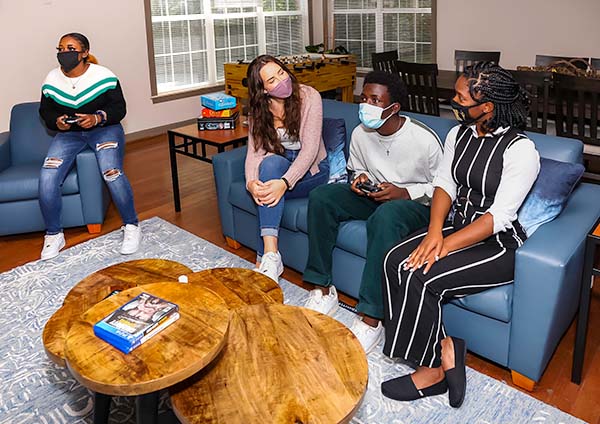
Despite the pandemic, the ASCEND House residents find opportunities to connect with one another as much as possible – house dinners, outings, workshops and study sessions. Some take the Big Owl Bus to the Kennesaw Campus together for classes, while others like to work out at the rec center or go to the dining hall together.
“There’s always someone in the house, and we’re getting closer and closer,” said Placide Mutombo, an information systems major. “They give me advice, and that kind of therapy is helpful.”
The ASCEND residents said they embrace that there are so many different life stories, and they rave about the organized group activities. As students make the transition from high school to college, they contend that having a KSU “family” has been life-changing.
“It’s a unique college experience, and it’s been really fun,” said Soleil Chiasson, a sophomore journalism major. “We have an unspoken bond that we all feel. It’s something I’ll carry with me for the rest of my life.”
– Tiffany Capuano
Photos submitted
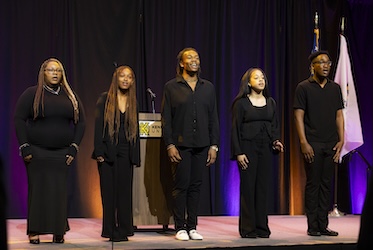
Kennesaw State honors the Legacy of Martin Luther King Jr. at annual event
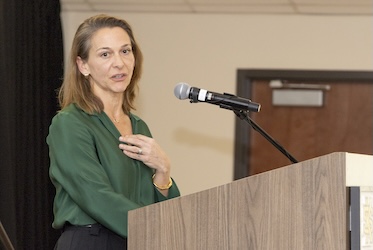
Alumna's donation strengthens CARE Services' support for KSU students in need
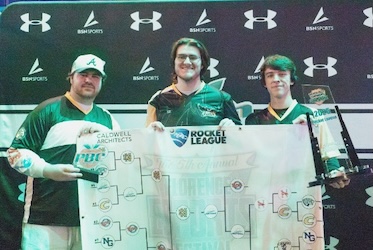
Esports team earns first place in two divisions at the Peach Belt Conference Championships
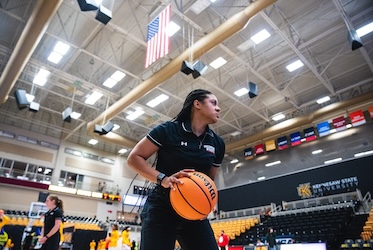
Former SGA president thrives in player development role for Georgia State women's hoops
A leader in innovative teaching and learning, Kennesaw State University offers undergraduate, graduate, and doctoral degrees to its more than 51,000 students. Kennesaw State is a member of the University System of Georgia with 11 academic colleges. The university's vibrant campus culture, diverse population, strong global ties, and entrepreneurial spirit draw students from throughout the country and the world. Kennesaw State is a Carnegie-designated doctoral research institution (R2), placing it among an elite group of only 8 percent of U.S. colleges and universities with an R1 or R2 status. For more information, visit kennesaw.edu.